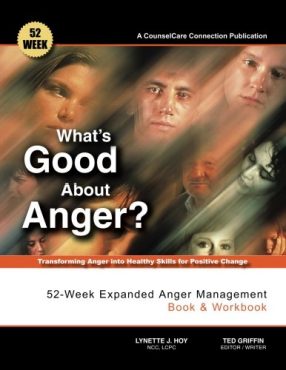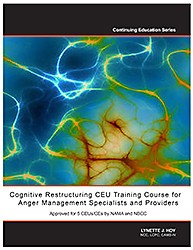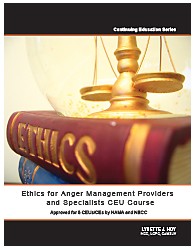Do you want to teach effective skills for managing anger to a group or class? This newly Expanded 52 week Group Anger Management Program includes all the tools you need for helping people learn how to control anger – transforming it into assertiveness, problem-solving, empathy, conflict resolution and forgiveness!
This Expanded Group Curriculum for Leaders is geared to teach individuals who are mandated by a court, employer, school or institution to take an anger management program, group or class. Teach people how to achieve their goals by changing ‘hot self-talk’ to ‘cool talk’, applying relaxation skills, learning ‘Thinking Ahead’ strategies, how to handle difficult people and difficult situations with time-outs, empathy and the ASERT skills.
The curriculum includes the following: What;s Good About Anger? 52 week/lesson combination book/workbooks — 15; 65 min video on flash drive, quizzes; Leaders guide for 52 lessons/weeks; assessment tools, enrollment, progress and certificate templates.
Includes:
The What’s Good About Anger? 52 week Group curriculum. This anger management program employs these major areas and anger control interventions:
- Identifying triggers
- Logging scenarios
- Applying new skills such as: time-outs, prayer
- Addressing issues with assertiveness
- Establishing a plan of action
- Relaxation Techniques
- Learning to negotiate
- Stress Management Skills
- Changing self-talk
- Learning to forgive
- Managing Conflict
- Gaining Control Over Emotions
- Building Relationship Skills
- Developing Emotional Intelligence Skills
- Applying Collaboration Skills
- Building Healthy Relationships
- De-escalating a Confrontation
- Developing Empathy in Relationships
- Preventing Aggression and Negative Responses
- Applying Problem-solving Techniques
- Maintaining Skills Over the Long-Hall
Many courts and employers throughout the USA have approved our online and home study anger management courses. This program is offered by Lynette J. Hoy, a National Certified Counselor, Marriage and Family Counselor, Licensed Clinical Professional Counselor (in State of Illinois), Anger Management Specialist-V, Supervisor, Consultant and Diplomate with the National Anger Management Association, Domestic Violence Advocate, Crisis Counselor and Certified Anger Management Specialist-V. Lynette is the co-author of all editions of What’s Good About Anger?, the author of all the workbooks and training manuals. Mrs. Hoy has trained thousands of students and clients in anger and conflict management.
The 52-week course covers the following topics and goals:
In What’s Good About Anger? co-authors Lynette Hoy and Ted Griffin teach how to decrease stress and turn anger into assertiveness, problem-solving, conflict management, empathy and forgiveness! Participants learn to identify the problem, power and process of anger (from annoyance to bitterness or rage); effective examples of “good anger”; and how research-based skills can effectively manage anger and be used to accomplish personal and relational goals.
Participants will gain a new perspective on anger, how to prevent flare-ups and how to better manage responses to provoking situations. Chronic anger can be costly – physically, emotionally and relationally. Most people can use their anger in appropriate ways in some situations, and yet can be ineffectual or harmful in other situations. Participation in this anger management course can reduce levels of anger, and help individuals learn ways to direct anger into healthy, effective coping behaviors to stop escalation and to resolve conflicts.
Logging anger, triggering situations and applying new approaches helps individuals to contain and manage anger.
Goals: To reduce levels of anger in provocative situations. To learn effective coping behaviors in order to halt escalation of anger and to resolve conflicts. To maintain and consistently develop effective skills for managing anger.
Course Outline
Instructions
Lessons (each lesson equals one hour of course work):
LEADERメS GUIDE- SESSION ONE: Anger: friend or foe? Introduction to the problem and types of anger.
Goal: To define anger, how it affects people and relationships. To begin to explore triggers for anger and foundational teachings about anger.
Session Plan:
Welcome participants and introduce yourself. Have the members of the group introduce themselves. Present Rationale: Explain the purpose of learning anger management: To increase self-control (control over own behavior/thoughts). To handle conflict and provocation more effectively. Most importantly: Learn to put your anger to work for good!
The What’s Good About Anger? anger management course and group employs the these major areas and anger control interventions:
- Understanding the dynamics of anger,
- Identifying triggers and underlying causes,
- Logging scenarios,
- Applying new skills such as: time-outs, prayer,
- Addressing issues with assertiveness,
- Establishing a plan of action,
- Learning to problem-solve,
- Getting guidance from a counselor, coach or mentor when needed,
- Changing self-talk and cognitive distortions,
- Turning anger into forgiveness,
- Applying Stress management and Conflict management skills,
- Developing Emotional Intelligence and Empathy skills
- Defusing Aggression
- Taking Responsibility
Table of Contents:
| INTRODUCTION AND OVERVIEW | 5 |
| ANGER SURVEY | 8 |
| 1: ANGER’S MANY FACES | 13 |
| 2: THE POWER OF ANGER | 19 |
| 3: WHAT IS GOOD ABOUT ANGER? | 27 |
| 4: DEFUSING ANGER BY MANAGING STRESS | 33 |
| 5: HANDLING ANGER EFFECTIVELY | 43 |
| 6: ANGER AND ASSERTIVENESS | 49 |
| 7: MANAGING CONFLICT | 57 |
| 8: TURN YOUR ANGER INTO FORGIVENESS | 65 |
| 9: WHEN TO TAKE A TIME-OUT | 73 |
| 10: PLAN TO CHANGE YOUR LIFE BY CHANGING YOUR THINKING | 77 |
| 11: HOW EMOTIONAL INTELLIGENCE IMPACTS ANGER | 87 |
| 12: BUILDING HEALTHY & SUCCESSFUL RELATIONSHIPS | 97 |
| 13: CHOOSING BEHAVIOR ALTERNATIVES | 101 |
| 14: PREVENTING & INTERRUPTING AGGRESSION | 105 |
| 15: STOP BLAMING-ACCEPT RESPONSIBILITY | 111 |
| 16: FACING THE CONSEQUENCES OF ANGER | 115 |
| 17: EVALUATING YOUR CONFLICT STYLE | 117 |
| 18: WHAT’S GOOD ABOUT CONFLICT? | 119 |
| 19: KEYS TO COLLABORATION | 123 |
| 20: 4 STEPS TO MANAGING ANGER | 127 |
| 21: WINNING OR RESOLVING CONFLICT AMICABLY? | 131 |
| 22: APPLYING THE SUM-UP AND CONNECT SKILLS | 135 |
| 23: CONTROL ISSUES – TAKE RESPONSIBILITY | 139 |
| 24: STRESS INVENTORY | 143 |
| 25: STRESS RELIEVERS | 147 |
| 26: CONFLICT AND CONTROL ISSUES | 149 |
| 27: REVIEWING THE PROCESS OF ANGER: CONTROLLING IT’S TRIGGERS | 155 |
| 28: WHAT IS GOOD ABOUT ANGER? | 159 |
| 29: DEFUSING ANGER BY MANAGING STRESS: PART 2 | 161 |
| 30: HANDLING ANGER EFFECTIVELY: PART 2 | 163 |
| 31: EVALUATING YOUR PROGRESS | 165 |
| 32: HOW MOTIVATION IMPACTS LASTING ANGER MANAGEMENT | 171 |
| 33: TALK YOURSELF OUT OF ANGER | 175 |
| 34: CHANGING ANGRY THINKING | 179 |
| 35: RELAXATION SKILLS TO BREAK ANGER ESCALATION | 181 |
| 36: HOW EXPECTATIONS AFFECT ANGER | 183 |
| 37: MANAGING SELF-ESTEEM ISSUES TRIGGERING ANGER | 185 |
| 38: A SPIRITUAL PERSPECTIVE ON ANGER AND GUILT | 189 |
| 39: RESPONDING TO SOMEONE ELSE’S ANGER & PROVOKING BEHAVIOR | 191 |
| 40: SCREENING FOR EMOTIONAL INTELLIGENCE | 195 |
| 41: FORGIVENESS – WHERE ANGER ENDS | 199 |
| 42: CHANGE YOUR BRAIN WITH POSITIVE THINKING AND SELF-TALK | 203 |
| 43: INTERPERSONAL COMMUNICATION AND CONFLICT RESOLUTION | 207 |
| 44: BUILDING EMPATHY SKILLS – PART 2 | 211 |
| 45: LEARNING FROM ANGER | 213 |
| 46: MEASURING YOUR ANGER MANAGEMENT PROGRESS | 215 |
| 47: DE-ESCALATING A CONFRONTATION | 219 |
| 48: NEGOTIATE TO WIN-WIN | 221 |
| 49: ANGER CAN BE A MASK | 225 |
| 50: BUILDING HEALTHIER RELATIONSHIPS | 227 |
| 51: MAKING ANGER WORK FOR YOU | 231 |
| 52: TURNING IT OVER TO YOUR HIGHER POWER | 233 |
|
CASE STUDY: BOB |
235 |
| APPENDIX: ASSERTIVENESS SCENARIOS, COGNITIVE STRATEGIES & BELIEF INVENTORY | 239 |
| NOTES | 248 |
| BIBLIOGRAPHY | 249 |
| ABOUT THE AUTHORS & RESOURCES |
Introduction and Support Group Guidelines: Review pages in the book covering the introduction, assignments, and Support Group Guidelines.
1. Read the foreword found in the book.
2. Introductory Questions: What brought you to the group? What do you hope to learn?
What pictures or words come to mind when you think of anger?
How would you define anger?
3. Survey: Provide some time to complete a portion of the survey in the book or workbook. Ask participant’s to total their scores from questions one & two.
Present and teach: Chapter Two: Anger’s Many Faces.
Anger, though potentially harmful, can be transformed into a positive force accomplishing great good in our lives. Ted Griffin and Lynette Hoy
Teaching points and insights:
The first session is critical to helping participants, clients and students gain an overview and understanding of the emotion of anger- what it is, that it is normal, often harmful but, can be expressed in healthy ways. Many participants may be court-ordered to take the class or sessions so, it is important to try to win them over helping them to accept the classes and see that they can benefit from the information and curriculum. How can you accomplish this? Start out with presenting everyday examples of anger – yours, class members, examples from society and the book and treating each individual with respect. Have participants take a portion of the survey and share the results and discuss a scenario in which they became angry. Ask people to share why they have come and what they hope to gain from the classes. Those members who do share may motivate and help other’s who are angry about being there. The following questions may help bring out some of the quieter more distant members and apply the course material.
Begin discussion about the benefits of transforming anger both personally and relationally.
Discussion:
…How have you experienced anger in your family?
…Can you identify with Lynette or Ted’s experiences?
…What kinds of situations most often make you feel angry?
…Do you see anger as a friend or foe? Why? Write out one situation you wnat to improve.
…What might happen if you acknowledged your anger?
…How do you express your anger? What is your typical response to feelings of anger?
…What have been the consequences of your anger? Descibe.
…How has your anger affected your life and relationships?
…What is your reason for coming to the group? Write it out.
…How will expressing your anger in healthy ways benefit you?
…Write out one anger management goal you would like to achieve in your book or workbook.
Foundational Insights:
“Anger is an energy or force which is often harmful. Anger is caused by feelings of helplessness and the need to control situations, people and consequences. Anger –- when expressed in a healthy way — can foster personal growth and significance, improving relationships and changing lives.





